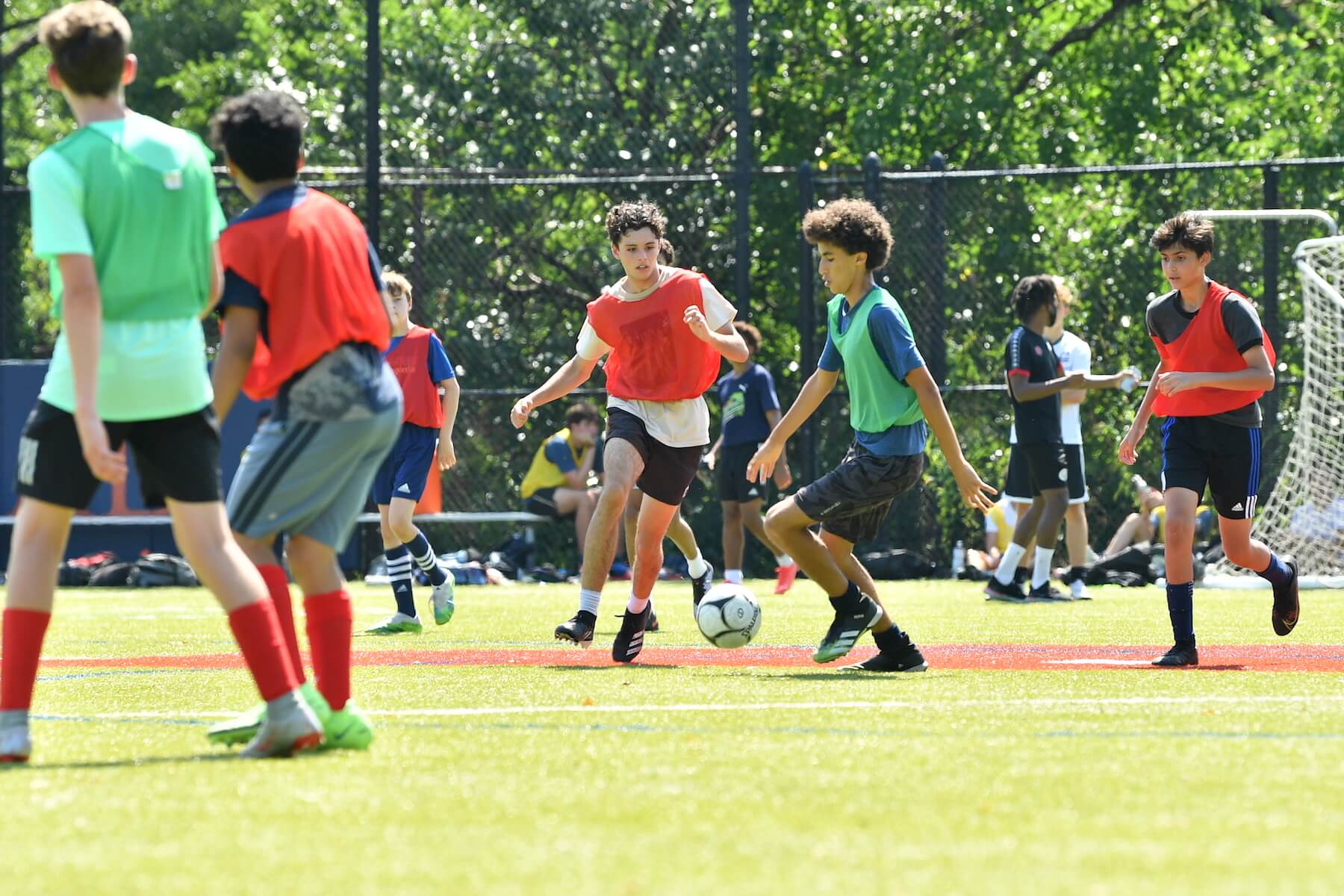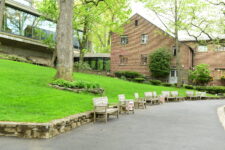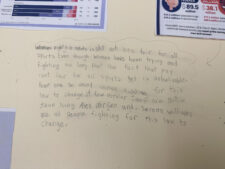“Circle up!” bellows Clare Mottola, Chair of the Fieldston Middle and Upper Theatre and Dance Department, to a room of excited Fieldston Upper students.
It’s a temperate day in October, and the room is abuzz with excitement. The scene is familiar, energetic, and alive — it’s the first day of tech week before the Fall Drama, “Julien,” premieres. As Mottola outlines her expectations for the week, students listen intently. Every student seems eager and ready as Mottola begins to touch on the unique challenges they’ll be facing this year, and on the groundbreaking work they’re about to undertake — performing the Fall Drama outside on the Quad. After all, as familiar as the scene is, it feels far from normal: This is the first tech week held on campus since the onset of COVID-19.
Now in her 24th year teaching at the Ethical Culture Fieldston School, Mottola has her finger on the pulse of life at the School. She describes the impact of COVID-19 as one of intense conversations and canceled programs, of a sense of loss in the community. “Our School and our departments are really profound homes for people,” she says. COVID-19, she explains, saw that home disrupted — with sudden distance in a community of students who value connection and intimate environments no longer possible in the age of physical distancing.

The Theatre and Dance Department used the disruption of the pandemic as an opportunity to reinvent and reinvigorate themselves. “This past year has been a turning point for us,” says Mottola. Committed to reinventing theatre in a virtual space rather than simply transposing the old onto the new, the Theatre and Dance Department commissioned five writers to generate new work intent on utilizing the confines and restrictions of the now much-familiar Zoom or Google Meet screen.
The department witnessed students truly take to the challenge, creating content possible only in a virtual environment. “We had a play which took place at a drive-in,” recalls Mottola. The play featured six actors playing three couples, with the two students in each couple situated beside each other in the virtual layout. Through virtual meetings and rehearsals, the students put on a show wherein the props could be passed from one screen to the next, and in which — despite their physical distance — the actors inhabited a space of collaboration.
“Being in theatre right now is a bit like being in control of the chaos,” Mottola muses. “There’s so much about live theatre we can’t control.” This notion of control, Mottola points out, is similar to the reality ECFS students are living through. With the pandemic ongoing and the situation ever-evolving, students and their families have started looking for ways to grow past the difficulties, to transform in ways that will open up new doors.
That ethos of ongoing transformation is visible now more than ever as life returns to some semblance of normalcy. With all students back on campus, it’s full steam ahead in every department. In Theatre and Dance, that energy is evident in “Julien,” a new play written specifically for the current epoch at ECFS. “We’re basically taking the auditorium and recreating it outside on the Quad,” Mottola explains regarding the unique approach the department is taking to being back in person. She outlines how they will be using the unique space of the Quad as an outdoor theatre, bringing the campus to life in new ways. While this is a monumental effort, the excitement is palpable in both Mottola and her students.
It’s been stressful, but the stress is well worth it. The theatre kids are very close. It’s about being around people you like being around.
“I never want to do indoor theater again,” she says with a laugh.
“It’s been a really different but really cool experience,” says Noa S. ’25. She looks to her friend, Susie H. ’25, who confirms.
“It’s been stressful,” Susie says, but the stress is well worth it. “The theatre kids are very close. It’s about being around people you like being around.”

“Don’t let this game end,” Gus Ornstein ’94, ECFS Director of Athletics, remembers thinking. “This might be it for a while.” Ornstein recalls being at a baseball scrimmage in March 2020, just before Spring Recess, when the news hit that the School would be closing its campuses and transitioning to remote learning.
Ornstein characterizes those early months of the pandemic as a slow-rolling realization that things wouldn’t be returning to normal anytime soon. And as the fall 2020 athletics season approached, Ornstein knew the world was still far from normal.
“First it was canceling the fall pre-season,” he says. After that, it was about figuring out how to ensure that the students, already stressed from loss of community and such trying times, still had something good to hang on to.
While every department at ECFS was affected by COVID-19, the Athletics and Theatre and Dance departments were hit in especially unique ways. How do you practice a contact sport when students need to stay six feet apart at all times? How do you perform a play or a dance when you can’t get students under one roof, let alone together for rehearsals? Or, as Mottola puts it, “How do we build community in spite of our distance?”

The answer for both departments came back to this idea of keeping students connected, not despite their circumstances, but because of them.
“We pivoted to a community-oriented mindset,” Ornstein explains. For the 2020–2021 academic year, with no games to play due to ongoing COVID-19 restrictions, the Athletics Department shifted its focus from winning games to building camaraderie among the students. While Ornstein explains that being student-focused has always been present in his vision for Athletics at ECFS, it became the backbone of the department during the pandemic. Crediting the work put in by his coaching staff and the spirit exhibited by the students and their parents/guardians, Ornstein explains how inclusivity came naturally even as the community found itself cut into physical halves with the hybrid learning model. If some students were in person, whether on the basketball court or the football field, there was always a laptop nearby, camera pointed at the action, for the students off campus that day. It was a chance to slow down, focus on the technical work, and celebrate team building.

“In a time where many people gave up on certain activities and routines,” says Jedd H. ’23, who plays on the boys varsity soccer team, “Fieldston fought to give their students a needed sense of normalcy. The community the School works so hard to develop and strengthen is very strong.”
Even during incredibly difficult times, Ornstein emphasizes, the students had fun. “That was the most important part of the experience,” he says. With half of any team remote at a given time, practices took on a more lighthearted tone. Ornstein, a Fielston alum and former quarterback for the Fieldston Varsity football team, returned to his old position. “I got to make a comeback,” he jokes about practice days when the student quarterbacks were virtual. On those days, Ornstein gladly stood in on the field.
For the 2021–2022 academic year, students and coaches are thrilled to have some semblance of normal back. With students on campus full time, regular practices and games have resumed. In October, the School hosted a successful Homecoming, with hundreds of ECFS families, students, alumni, faculty, and staff gathered together on campus to cheer on Fieldston athletes. After many months of isolation and hardship, the event felt particularly joyful. The girls varsity soccer team capped the 2021–2022 fall season by winning their first-ever NYSAIS championship — an incredible accomplishment.

“There’s a resilience to kids that we as adults don’t understand,” Ornstein explains. “There’s a mentality of getting back up again in the face of setbacks.” Whether it’s the volleyball players adapting to playing games while fully masked or everyone coping with seating charts on buses and rigorous COVID-19 testing protocols to keep the community safe, there’s a real sense of looking forward. “It’s funny,” Gus reflects. “We’ve been in this space for so long. But once the game starts, you’re just playing baseball. You’re not thinking about COVID-19 for once, even if it’s always there in some form.”
There’s a resilience to kids that we as adults don’t understand. There’s a mentality of getting back up again in the face of setbacks.
Through it all — the setbacks, the surprises, the transformations, and the adaptations — Ornstein and Mottola make one thing extremely clear: At the end of the day, the School’s success in adapting to COVID-19 isn’t just about the students — they are because of the students.
“The School’s value is to create ethical leaders,” says Mottola. “The art that we make has to reflect that. Everything we do is student-driven. They conceive it, they push it, they pull it. As adults, our job is just about unlocking the right doors for them.”
“We want to win as badly as anybody else,” Ornstein says with a laugh. “We just want to do it in a way that reflects who we are.”
As students get back into on-campus life, they are displaying admirable resilience. Despite the masks, despite the disruptions, despite the ongoing chaos and the never-ending questions about what comes next, at ECFS, the students aren’t just surviving — they are thriving.



